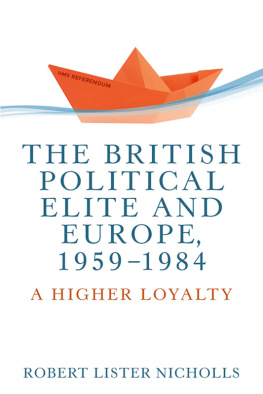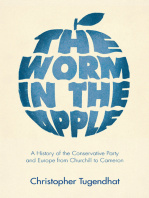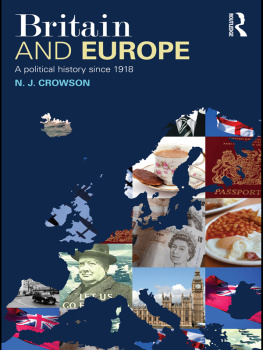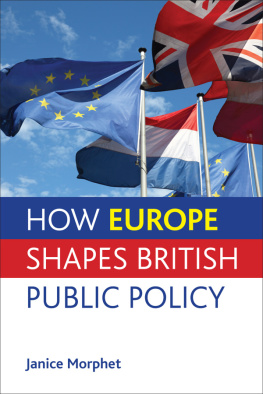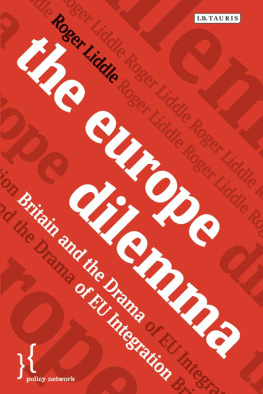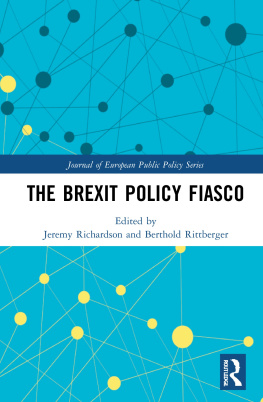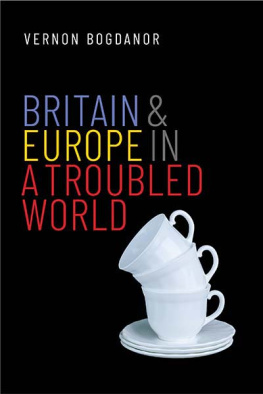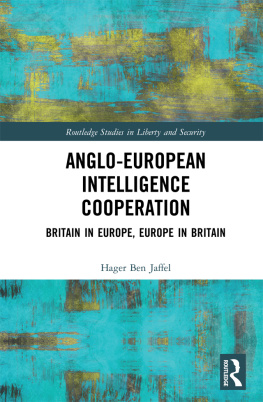The British political elite and Europe, 19591984
A higher loyalty
Robert Lister Nicholls
Manchester University Press
Copyright Robert Lister Nicholls 2019
The right of Robert Lister Nicholls to be identified as the author of this work has been asserted by him in accordance with the Copyright, Designs and Patents Act 1988.
Published by Manchester University Press
Altrincham Street, Manchester M1 7JA
www.manchesteruniversitypress.co.uk
British Library Cataloguing-in-Publication Data
A catalogue record for this book is available from the British Library
ISBN978 1 5261 2477 7hardback
First published 2019
The publisher has no responsibility for the persistence or accuracy of URLs for any external or third-party internet websites referred to in this book, and does not guarantee that any content on such websites is, or will remain, accurate or appropriate.
Typeset
by Toppan Best-set Premedia Limited
In memory of my loving parents, Robert and Emily Nicholls
The writing of this book would not have been achieved without the help and guidance of my former doctoral supervisor, Professor Brendan Evans.
I am particularly indebted to Dr Alison Rodriguez for donating her valuable time to read and provide constructive comments on this work.
Extra special thanks must be extended to Lord Clark of Windermere, the late Lord Howe of Aberavon, the late Sir Gerald Kaufman, Philip Davies MP, Mike Wood MP, the late Stanley Crowther MP, Dr Richard North and Christopher Booker for graciously affording me their time for interviews. I also extend my gratitude to those other contributors with whom I engaged in correspondence over the course of researching this book.
I also wish to express my profound gratitude to the following organisations that have allowed me to access their archives. The staff of the People's History Museum in Manchester, the staff of the Hull History Centre, the staff of the University of Huddersfield Library and Archive, the staff of the University of Leeds library (especially in respect of their Hansard collection), the staff of the British Library in London and Boston Spa, the staff of the British Library Newspapers section in London, Conservative Central Office, and last but not least, the staff of the Bodleian Library, Oxford. These organisations have provided a significant amount of primary source materials upon which this book relies.
| ACML | Anti-Common Market League |
| AEU | Alternative European Strategy |
| BIE | Britain in Europe |
| CAP | Common Agricultural Policy |
| CBI | Confederation of British Industry |
| CCO | Conservative Central Office |
| CDS | Campaign for Democratic Socialism |
| CIA | Central Intelligence Agency |
| DUP | Democratic Unionist Party |
| EC | European Community |
| ECSC | European Coal and Steel Community |
| EDC | European Defence Community |
| EEC | European Economic Community |
| EFTA | European Free Trade Association |
| ERM | Exchange Rate Mechanism |
| EU | European Union |
| NATO | North Atlantic Treaty Organisation |
| NEC | National Executive Committee |
| NFU | National Farmers Union |
| NOP | National Opinion Poll |
| NRC | National Referendum Campaign |
| PLP | Parliamentary Labour Party |
| PPS | Parliamentary Private Secretary |
| SDP | Social Democratic Party |
| TGWU | Transport and General Workers Union |
| TUC | Trades Union Congress |
| UKIP | United Kingdom Independence Party |
| VAT | Value Added Tax |
The current problems over Britain's membership of the European Union result largely because of an absence of quality debates during the critical period from 1959 to 1984. The situation today is attributed to members of the political elite from this period subordinating the question of Britain's future in Europe to short-term, pragmatic, party management or career considerations. In an historical examination of the impact short-term political expediency played in the positions adopted by members of Britain's political elites in the debates over Europe, the argument advanced is that many MPs failed to consider the long-term implications of membership. This failure subsequently led to Britain's continued troubled relationship with Europe and ultimately to leaving the European Union.
Exploring the background to the British government's early attempt at European Economic Community (EEC) membership, and concluding with the year that both major political parties accepted Britain's place in Europe, this book examines decision-making in Britain with particular reference to the relationship between elite and mass opinion. It focuses on the short-term political motives of a representative sample of the leading politicians involved in the critical decisions on whether Britain should join the Common Market. The findings cast light on the current toxic dilemma on the issue of Europe, and from today's perspective, enhances the capacity to view the period 19591984 far more effectively. As Europe is the most important issue confronting Britain in the post-war years, this book contributes to an understanding of Britain's political elites in the policy-making process, and adds explanatory value to the key issue of Britain's continued troubled membership of the European Union. It provides an explanation as to why Britain made successive applications, and eventually joined the EEC. A number of key questions are answered. These include why Britain's relationship with Europe has been so troubled, with British exceptionalism and Euroscepticism ultimately resulting in Britain's decision to leave the EU; whether the British public was largely misled by the political elite in respect of the true aims of the European project; and why Britain's relationship with Europe continues to remain such a toxic issue for both the Labour and Conservative parties.
My own position on Britain's membership of the EU is not wholly straightforward. Having voted to remain in the EEC in 1975 and to leave the EU in 2016, with substantial reservations on both occasions, my view in many ways reflects the complexities of the issue. This book therefore looks at Britain's relationship with Europe evidentially, and as far as humanly possible, without bias.
There is a wealth of publications on Britain's relationship with Europe, and whilst some of the literature on the issue inevitably overlaps with this book, there are no competing titles. Most books on this subject concentrate on a particular aspect or period of Britain's relationship with Europe. Stephen Wall's Official History of Britain and the European Community (2013) for example, is a highly detailed work covering the period 19631975. However, the quality of the debates over Europe is not addressed, nor does this work fully examine the motives of individual members of the political elite in adopting a particular position on EEC membership. Similarly, Robert F. Dewey's British National Identity and Opposition to Membership of Europe, 196163 (2009) provides an excellent account, but covers only a limited time period. Hugo Young's This Blessed Plot (1999) is a compelling narrative and offers an insightful account of the issue. Understandably, however, the work is journalistic and is written from a distinctly pro-Europe perspective. In addressing previously unanswered questions therefore, this book serves to fill a gap in the existing literature. This is particularly true of the book's central argument: that the lack of an adequate debate throughout the twenty-five year period 19591984 led to the problems faced by the current Conservative government.

